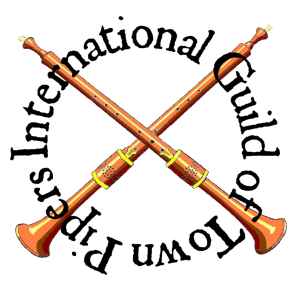The 2nd Festival of the International Guild of Town Pipers
York, 7th-9th July 2006
Part of York Early Music Festival
On July 6th, two Leeds Waits started some pilgrims from Barley Hall off on their pilgrimage to York for the mystery plays, but the Festival proper started on July 7th, with the arrival in York of five veterans of the first festival – the bands from Doncaster, King’s Lynn, Leeds, York and ‘s-Hertogenbosch, holding a musical procession through the streets of York for a civic reception by the Lord Mayor and Sherriff at The Mansion House. After a few drinks (it’s very thirsty work playing wind instruments) while the various bands serenaded the Lord Mayor, after which we processed away to our hotel, changed back into civvies and were joined by a newly revived set of waits from Gloucester for an evening reception by the York Guilds at Bedern Hall, with drinks, a buffet supper and a fascinating talk on the history of waits by our Patron, Professor Richard Rastall.
Saturday dawned, and after breakfast we headed off down Bootham for the day’s performances. Five of the groups performed in turn at six performance venues around York – St Mary’s Abbey, King’s Manor, Barley Hall, Holy Trinity Goodramgate, St Helen’s and College Green – while the York Waits headed off down the road to The National Centre for Early Music to perform live on The Early Music Show on Radio 3. We all gathered on College Green at 3.30 on Saturday afternoon – 37 waits and stadspijpers, together with 6 workshop participants from the North-East Early Music Forum workshop for shawms, sackbuts and curtals run by Norbert Kunst, Director of the Stadspijpers; and the massed band of shawms, sackbuts and curtals performed seven pieces under the inspired direction of Norbert to an audience of several hundred members of the public. The audience certainly enjoyed the music, but the musicians enjoyed it more!
After a thirst-inducing day’s playing, we took a short ghost walk (short walk, not short ghosts, although the Roman soldiers were cut off at the knees), and then retired to York Brewery for a buffet meal and a few jars of ale.
July 9th dawned, and after breakfast the waits of Leeds, King’s Lynn and Doncaster played for the arrival of the pilgrims from Nostell Priory. Then it was on to the mystery plays. The idea of waggon performance is that everything is ready for the performance as soon as the waggon reaches the performance station. That may be the theory, but some waggons seem to need unpacking and repacking at each station. Our role was to play while each play processed between the four performance stations (Dean’s Park, College Green, St. Sampson’s Square and Museum Gardens), and for the unpacking and repacking. There were twelve plays being performed this year, and we worked with ten plays, so four bands did two circuits. Because of their return flight from Leeds, ‘s-Hertogenbosch could only lead round one play, then head for the airport in the Festival minibus.
Just to show that we’re gluttons for punishment, the waits of Doncaster, Leeds and York returned on July 16th for another day with the mystery plays.
Alan Radford, Leeds Waits.
Thanks are due to many people for the excellent smooth running of the Festival, including Mike Tyler (pageant master) and Paul Toy (musical director) of the Guilds of York; York City Council officer Liz Topi and her boss Peter Boardman; the Arts Council for funding; James Merryweather, who originally came up with the idea of our Guild, and who designed the pamphlet for the festival; Jonathan Ridy and his team of stewards who ensured that the bands were well looked after at the venues on the Saturday; and the festival committee for all their hard work, especially Alan and Pam Radford of Leeds and Roger and Andrea Offord of Doncaster who between them did the bulk of the work.
Chris Gutteridge, King’s Lynn Waits.
Bands who took part in this festival: The York Waits, King’s Lynn Waits, Doncaster Waites, Leeds Waits, Gloucester Waits and the Stadspijpers van ‘s-Hertogenbosch.
